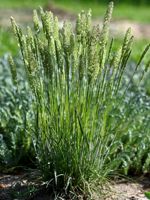Mon-Fri 9am - 5pm Mountain time
Junegrass vs Common Gaillardia
Koeleria macrantha
Gaillardia aristata
NOT AVAILABLE THIS SEASON - MIGHT RETURN
NOT AVAILABLE THIS SEASON - MIGHT RETURN
Junegrass is a native, low-growing perennial bunchgrass commonly found in prairies and open woodlands. It is a great choice for prairie restoration and naturalization projects or an attractive accent in ornamental plantings. Spear-shaped seed heads rise above the gray-green lower leaves, maturing to a tan color. Flowering earlier than other upright prairie grasses, it greens up quickly in spring and maintains its appeal well into the fall. It is shorter in stature and rarely forms thick stands, which adds to its understated visual appeal.
Adapted to cooler climates, Junegrass thrives in well-drained, rocky, sandy, or gritty soils and can tolerate drought, cold, and high altitudes. It actively grows in spring and fall when soil temperatures are cool, but in areas that are too hot or humid, it may go dormant by late summer.
As a perennial, it dies back to the crown each winter, it will regrow from the base in the spring. Avoid disturbing the crown during late winter to ensure healthy growth the following season.
Common Gaillardia is a native perennial wildflower known for its vibrant, daisy-like blooms. Flower petals vary in color from two-tone blooms with an orange-red center and yellow tips to solid yellow. Blooming from early summer to fall, it provides continuous color while attracting bees, butterflies, and other pollinators. The seeds also serve as a food source for birds, adding to its ecological value.
Common Gaillardia is easy to grow and can tolerate heat and drought. If flowering slows in the summer heat, cutting back the plant can encourage a new round of blooms in the fall. It is ideal for pollinator gardens, xeriscaping, naturalization projects, and ornamental plantings.

